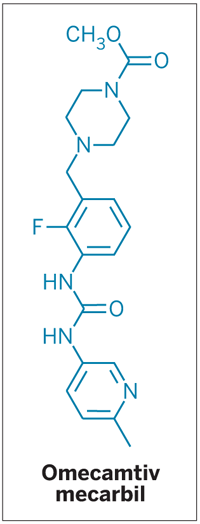Amgen, Cytokinetics expand collaboration on Omecamtiv mecarbil , CK-1827452, is a cardiac specific myosin activator

Omecamtiv mecarbil
Omecamtiv mecarbil
Omecamtiv mecarbil
Omecamtiv mecarbil
Omecamtiv Mecarbil provides new hope for heart failure patients
 A new drug which helps the heart pump more easily could improve the lives of thousands of people afflicted by debilitating heart failure, research suggests. Omecamtiv mecarbil is the first of a new class of drugs, called myosin activators, targeting proteins that make the heart contract. Rather than forcing the heart to beat more often, the drug causes heart muscles to contract for longer, increasing the volume of blood pumped out with each stroke. A British trial reported in The Lancet medical journal showed that omecamtiv mecarbil significantly improved the heart function of 45 heart failure patients.
A new drug which helps the heart pump more easily could improve the lives of thousands of people afflicted by debilitating heart failure, research suggests. Omecamtiv mecarbil is the first of a new class of drugs, called myosin activators, targeting proteins that make the heart contract. Rather than forcing the heart to beat more often, the drug causes heart muscles to contract for longer, increasing the volume of blood pumped out with each stroke. A British trial reported in The Lancet medical journal showed that omecamtiv mecarbil significantly improved the heart function of 45 heart failure patients.
Amgen, Cytokinetics expand collaboration
Thursday, June 13, 2013
Amgen and Cytokinetics, a clinical-stage biopharmaceutical company, have expanded their strategic collaboration to include Japan. In 2006, Cytokinetics and Amgen entered into a collaboration to discover, develop and commercialize novel small-molecule therapeutics that activate cardiac muscle contractility for potential applications in the treatment of heart failure. Omecamtiv mecarbil is the most advanced drug candidate in this collaboration.
- See more at:

Omecamtiv mecarbil , previously codenamed CK-1827452, is a cardiac specific myosin activator. It is clinically tested for its role in the treatment of left ventricular systolic heart failure. Systolic heart failure is characterised as a decreased cardiac output (<40% ejection fraction), due to decreased stroke volume, resulting in the inability to meet the metabolic demands of the body. The loss of contraction is caused by a reduced number of effective actin-myosin cross bridges in the left ventricular myocytes.

One possible underlying mechanism is altered signal transduction that interferes with excitation-contraction coupling. A decreased cardiac output causes peripheral hypotension and activation of the sympathetic nervous system. This in turn stimulates the cardiac myocytes excessively, eventually leading to left ventricular hypertrophy, characteristic of chronic heart failure. Some symptoms of systolic heart failure are fatigue, peripheral oedema, dyspnoea, exercise intolerance and breathlessness. Current inotropic drugtherapies such as dobutamine, are palliative and not a cure. They also cause many adverse effects including arrhythmias related to increased myocardical oxygen consumption, desensitization of adrenergic receptors and altering intracellular calcium levels. Thus systolic heart failure is considered malignant, however the novel mechanism of Omecamtiv Mecarbil is a hopeful long-term resolution.


Heart failure is often caused after the heart has suffered significant damage, this is something that can occur during a heart attack. A failing heart cannot provide sufficient blood flow to the body. Natasha Steward works for the British Heart Foundation (BHF) as a senior cardiac nurse. She has stated that, “it does seem that using certain doses of Omecamtiv Mercabil can offer some improvement to a damaged heart.”
Stewart also commented that, “This is a very early stage for the drug, the study we have seen here only took place for a very short time and with a small number of patients. Before we can say this drug is safe for use and will be effective, clinical trials of a much greater scale will need to be conducted.”
The BHF runs the Mending Broken Hearts campaign which raises money in the hope of finding a cure for heart failure. The campaign hopes to raise over £50m to spend on research to help the quarter of a million people who suffer from heart failure in the UK.


No comments:
Post a Comment